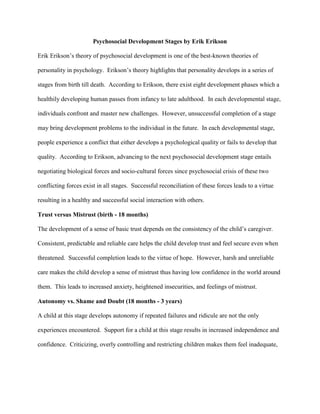
Erikson's Psycho-social Stages of Development
- 1. Psychosocial Development Stages by Erik Erikson Erik Erikson’s theory of psychosocial development is one of the best-known theories of personality in psychology. Erikson’s theory highlights that personality develops in a series of stages from birth till death. According to Erikson, there exist eight development phases which a healthily developing human passes from infancy to late adulthood. In each developmental stage, individuals confront and master new challenges. However, unsuccessful completion of a stage may bring development problems to the individual in the future. In each developmental stage, people experience a conflict that either develops a psychological quality or fails to develop that quality. According to Erikson, advancing to the next psychosocial development stage entails negotiating biological forces and socio-cultural forces since psychosocial crisis of these two conflicting forces exist in all stages. Successful reconciliation of these forces leads to a virtue resulting in a healthy and successful social interaction with others. Trust versus Mistrust (birth - 18 months) The development of a sense of basic trust depends on the consistency of the child’s caregiver. Consistent, predictable and reliable care helps the child develop trust and feel secure even when threatened. Successful completion leads to the virtue of hope. However, harsh and unreliable care makes the child develop a sense of mistrust thus having low confidence in the world around them. This leads to increased anxiety, heightened insecurities, and feelings of mistrust. Autonomy vs. Shame and Doubt (18 months - 3 years) A child at this stage develops autonomy if repeated failures and ridicule are not the only experiences encountered. Support for a child at this stage results in increased independence and confidence. Criticizing, overly controlling and restricting children makes them feel inadequate,
- 2. lack self-esteem, and feel a sense of shame or doubt in their own abilities. The aim at this stage is self control without a loss of self-esteem. Success in this stage leads to the virtue of will. Initiative vs. Guilt (3 - 7 years) Children at this stage begin to make up games, and initiate activities with others, and if given the opportunity, they develop a sense of initiative. Additionally, the child begins to ask many questions as the thirst for knowledge increases and if seen as trivial, a nuisance or embarrassing the child becomes guilty. Excessive guilt makes the child’s interaction with others slow and may inhibit their creativity. Balancing initiative and guilt bring success at this stage leading to the virtue of purpose. Industry vs. Inferiority (7 - 12 years) At this stage children start learning to read and write, do sums and make things on their own. The child’s peer group is of great significance and is a major source of the child’s self esteem. Positive reinforcement makes the child feel industrious and confident in their ability to achieve goals. Constant discouragement of the child’s initiative results in feelings of inferiority and doubt of their abilities. Some failure helps the child develop modesty, though, balance between competency and modesty is crucial. Success leads to the virtue of competency. Identity vs. Role Confusion (12 - 25 years) Children learn the roles they occupy as adults, and during this stage, adolescents re-examine their identity by trying to find more about themselves. Erikson highlights the two identities present at this stage as the sexual and the occupational. Adolescents form their own identity but, hindering the sense of whom they are often results in a sense of confusion about their role in the world. Moreover, adolescents may feel uncomfortable about their body for a while until they adapt and grow into the changes. Success leads to the virtue of fidelity.
- 3. Intimacy vs. Isolation (25 - 40 years) Starting at young adulthood, individuals begin to share themselves more intimately with others. They explore relationships with people other than family members for long-term commitments. Persons who successfully complete this stage enjoy comfortable relationships and a sense of commitment, safety, and care within a relationship. Avoiding intimacy, commitment and relationships lead to isolation, loneliness, and depression, but, success at this stage bestows the virtue of love upon an individual. Generativity vs. Stagnation (40 - 65 years) During this stage, individuals establish their careers, settle down within a relationship and begin their own families. They give back to society by raising children, being productive at work, and getting involved in communal activities. Failure to achieve these purposes, results in stagnation, though, success helps individuals gain the virtue of care. Ego Integrity vs. Despair (65 years and over) Individuals’ productivity slows down as they age and during this time they contemplate about their accomplishments. Erikson asserts that individuals develop integrity if they see themselves as leading a successful life and accomplished their goals. Unproductive individuals feel guilty and develop despair, often leading to depression and hopelessness. Success at this stage leads to the virtue of wisdom.